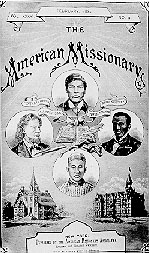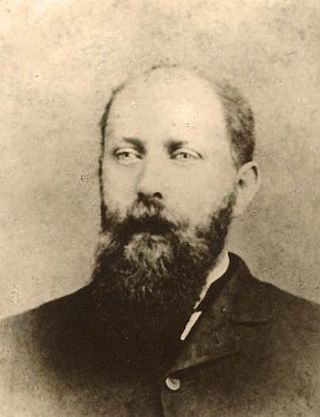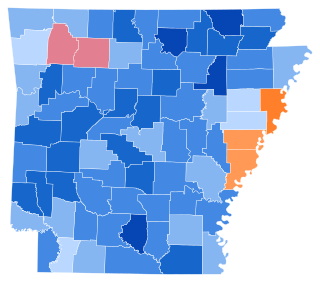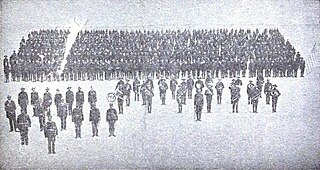
Josephus Daniels was an American diplomat and newspaper editor from the 1880s until his death, who controlled Raleigh's News & Observer, at the time North Carolina's largest newspaper, for decades. A Democrat, he was appointed by President Woodrow Wilson to serve as Secretary of the Navy during World War I. He became a close friend and supporter of Franklin D. Roosevelt, then Assistant Secretary of the Navy. After Roosevelt was elected President of the United States, he appointed Daniels as his U.S. Ambassador to Mexico, serving from 1933 to 1941. Daniels was a vehement white supremacist and segregationist. Along with Charles Brantley Aycock and Furnifold McLendel Simmons, he was a leading perpetrator of the Wilmington insurrection of 1898.

The American Missionary Association (AMA) was a Protestant-based abolitionist group founded on September 3, 1846 in Albany, New York. The main purpose of the organization was abolition of slavery, education of African Americans, promotion of racial equality, and spreading Christian values. Its members and leaders were of both races; The Association was chiefly sponsored by the Congregationalist churches in New England. The main goals were to abolish slavery, provide education to African Americans, and promote racial equality for free Blacks. The AMA played a significant role in several key historical events and movements, including the Civil War, Reconstruction, and the Civil Rights Movement.
Arthur Stanley Link was an American historian and educator, known as the leading authority on U.S. President Woodrow Wilson.

The University of Arkansas Press is a university press that is part of the University of Arkansas and has been a member of the Association of University Presses since 1984. Its mission is to publish peer-reviewed books and academic journals. It was established in 1980 by Willard B. Gatewood Jr. and Miller Williams and is housed in the McIlroy House in Fayetteville. Notable authors include civil-rights activist Daisy Bates, US president Jimmy Carter, former US poet laureate Billy Collins, and National Book Award–winner Ellen Gilchrist.

This is a selected bibliography of the main scholarly books and articles of Reconstruction, the period after the American Civil War, 1863–1877.
Joseph Willard Roosevelt was an American pianist and composer.

Alonzo Clifton McClennan was an African-American medical doctor who was the co-founder of the Charleston Hospital and Training School for Nurses in Charleston, South Carolina, established to provide for the education of black nurses, care of black patients, and hospital privileges for black doctors. It opened in 1897. McClennan had gone to medical school after being the second African American appointed as a midshipman to United States Naval Academy. He resigned in order to go directly into medicine. Graduating with medical and pharmacy degrees, he married and settled in Charleston, South Carolina, where he set up his medical practice.

John Gray Lucas was a lawyer and a state legislator in Arkansas during the early 20th century. He was appointed Assistant U.S. attorney in Cook County in 1934. Born in Marshall, Texas, in 1864, he eventually moved to Pine Bluff, Arkansas. He graduated from Branch Normal College of Arkansas Industrial University. He then got his law degree from Boston University School of Law in 1887, graduating with honors as the only African-American student in his class. He moved to Chicago.

The Brown Fellowship Society (1790-1945), which became the Century Fellowship Society, was an African-American self-help organization in South Carolina. It eventually became the Century Fellowship Society.

The 1948 United States presidential election in Arkansas took place on November 2, 1948, as part of the 1948 United States presidential election. State voters chose nine representatives, or electors, to the Electoral College, who voted for president and vice president. This would be the last presidential election where Arkansas had nine electoral votes: the Great Migration would see the state lose three congressional districts in the next decade-and-a-half.
Reuben C. Weddington was an American state representative in Arkansas. A Republican, he served in the Arkansas House of Representatives in 1891. He represented Desha County.
Benjamin Frank Adair was a lawyer who served in the Arkansas Legislature in 1891 representing Pulaski County.
G. W. Watson was an American politician. He was a member of the Arkansas Legislature in 1891. He represented Crittenden County. Watson was included in a photo montage of African American state legislators serving in Arkansas in 1891 published in the Indianapolis Freeman newspaper in Indianapolis.

John H. Carr was a farmer and member of the Arkansas Legislature in 1891. He represented Phillips County, Arkansas. He served in the Arkansas House of Representatives in 1891.
Jacob N. Donohoo was an American state politician and banker in Arkansas. He served several terms in the Arkansas House of Representatives after first winning election in 1876 when he was 22. He helped fundraise for the Masonic Temple in Pine Bluff, part of the Sovereign Grand Lodge of Free and Accepted Masons.
Henry Augustus Johnson was an American justice of the peace, sheriff, and state legislator in Arkansas.
William Demosthenes Crum, alternatively known as William Demos Crum, was an African American physician and diplomat.

The 1892 Arkansas gubernatorial election was held on September 5, 1892.

The Third North Carolina Regiment was an American military unit composed of colored troops from North Carolina mustered into federal service in the Spanish–American War. Unlike most regiments at the time, it was entirely led by black officers. The unit did not see active service in conflict and spent most of its existence in camps in North Carolina, Tennessee, and Georgia.

Charles Samuel Lafayette Alexander Taylor, commonly known as C. S. L. A. Taylor was an American lieutenant colonel and firefighter of the North Carolina National Guard. He was known for being one of the first black colonels during the Spanish–American War, serving as deputy commander of the 3rd North Carolina Volunteer Infantry Regiment. He was also known as a major figure within the Charlotte firefighters.











